Intercity Bus Security Grant Awards
Grant Awards for Fiscal Years 2006, 2007, and 2008

- Intercity Bus Security Grant Program
(IBSGP)Freight Rail Security Grant Program
FRSGP)Trucking Security Program
(TSP)Transit Security Grant Program Tier I
(TSGP Tier I)Transit Security Grant Program Tier II
(TSGP Tier II)

- Intercity Bus Security Grant Program
(IBSGP)Freight Rail Security Grant Program
(FRSGP)Trucking Security Program
(TSP)Transit Security Grant Program Tier I
(TSGP Tier I)Transit Security Grant Program Tier II
(TSGP Tier II)

"Over the years, we've moved away from a 'dividing the pie' strategy to one based on risk." - Kip Hawley, TSA Administrator
The FY08 Intercity Bus Security Grant Program (IBSGP) will provide a total of $11.2 million to operators of fixed route intercity and charter bus companies servicing one or more defined Urban Areas Security Initiative (UASI) jurisdictions. Of this total, $6.2 million was allocated for Tier I to six recipients with the largest bus fleets and most extensive services to high-risk urban areas, and the remaining $5 million was allocated for eligible recipients in Tier II. Proposals from 44 Tier II companies were selected for award by a panel of multi-agency experts.
Funding priorities for the FY08 IBSGP, as directed by the 9/11 Bill (PL 110-53) include:
- Development of assessments or security plan
- Development of a vulnerability assessment (VA)
- Development of a security plan
- Operating and capital costs associated with over-the-road bus security awareness, preparedness, and response training, including training for front-line employees for potential security threats and conditions (must be DHS-approved training courses)
- Live or simulated exercises for the purpose of assessing and improving the capabilities of entities to prevent, prepare for, mitigate, respond to, and recover from acts of terrorism (must be DHS-approved exercises)
- Public awareness campaigns for enhanced over-the-road bus security (must be DHS-approved)
- Modifying over-the-road buses to increase their security
- Installing cameras and video surveillance equipment on over-the-road buses and at terminals, garages, and over-the-road bus facilities
- Constructing and modifying terminals, garages, and facilities, including terminals and other over-the-road bus facilities owned by State or local governments, to increase their security
- Establishing and improving an emergency communications system linking drivers and over-the-road buses to the recipient’s operations center or linking the operations center to law enforcement and emergency personnel.
- Implementing and operating passenger screening programs for weapons and explosives
- Protecting or isolating the driver of an over-the-road bus
- Chemical, biological, radiological, or explosive detection, including canine patrols for such detection
- Acquiring, upgrading, installing, or operating equipment, software, or accessorial services for collection, storage, or exchange of passenger and driver information through ticketing systems or other means and for information links with government agencies, for security purposes
- Overtime reimbursement, including reimbursement of State, local, and tribal governments for costs for enhanced security personnel assigned to duties related to over-the-road bus security during periods of Orange or Red Alert levels or National Special Security Events
The following pie charts illustrate what types of projects will be funded by the FY08 IBSGP. For comparison purposes, project funding levels for FY06 and FY07 are also provided below for both the Tier I and Tier II bus companies.
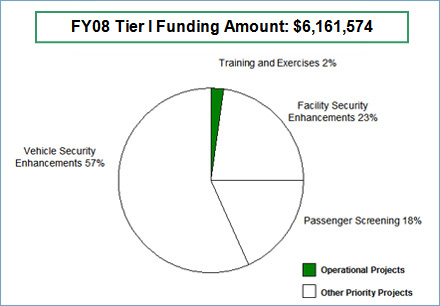
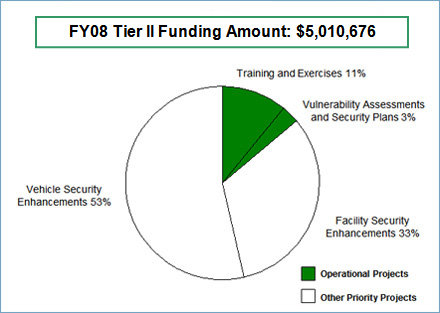
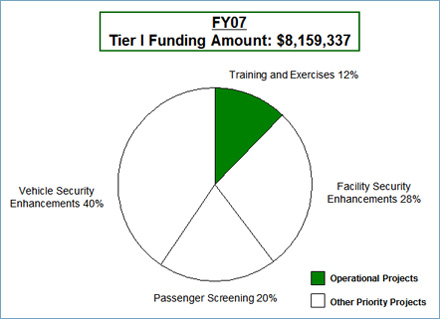
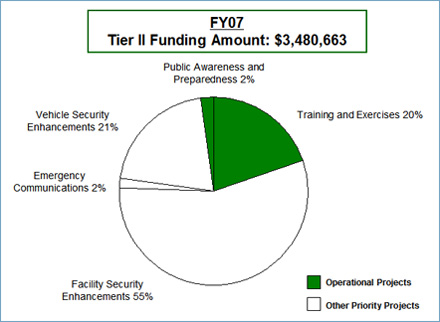
FY 2007 Intercity Bus Security Grant Program Tier II Awards (PDF, 40 KB)
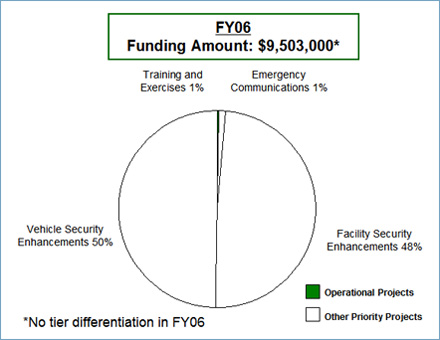
For more information about the award amounts to each grantee, please refer to the IBSGP funding table.
For more information about eligibility, program priorities, and the application process, please refer to the FY08 IBSGP guidance.
Featured Projects
Coach USA, Inc. Implements Security Measures
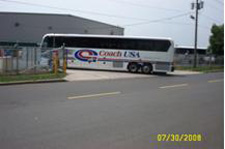
The Intercity Bus Security Grant Program (IBSGP) is one of five grant programs that constitute the Department of Homeland Security's (DHS) infrastructure protection activities. The vast bulk of America's critical infrastructure is owned and/or operated by State, local, and private sector partners. The funds provided by the IBSGP are primarily intended to support the work of operators of fixed route intercity and charter bus services.
Since 2003, Coach USA, Inc. (Coach USA) and its two dozen operating companies have received annual funding under the IBSGP to address a variety of security vulnerabilities in its Northeast and North Central operations. Coach USA's initial grant award in 2003 focused on anti-terrorist training for all employees in its Northeast Region, and security facility assessments of its major bus facilities in the Northeast. With a detailed understanding of the security deficiencies and gaps at each of Coach USA's yards, offices, garages and terminals, a detailed program and plan were developed to systematically address the vulnerabilities on a priority basis.
In 2005, Coach USA received grant awards for three key facilities in New Jersey with operations into New York City via the Lincoln Tunnel and the George Washington Bridge. The facility security enhancement projects in Elizabeth, Hoboken and Westwood, New Jersey addressed vulnerabilities identified by the security facility assessments. To improve the overall security at these facilities, Coach USA focused on fencing, lighting, surveillance cameras and controlling vehicle/employee access to the bus yards and buildings.
"With several threats and security incidents over the past several years at our New Jersey facilities, it is critical that we take steps to ensure that our bus yards, buildings and offices and overall operations are as secure as possible. [IBSGP] funding has allowed us to implement a comprehensive security program to close the key security gaps at these facilities. Bus services operating throughout the New York City/Newark Metropolitan area are obviously a potential terrorist target and what we have done to date and what we will do in the future will significantly reduce that risk on Coach USA's network" stated Don Carmichael, Senior Vice President, Operations & Safety, Coach USA Inc., Paramus New Jersey.
As part of future newsletters, we will be highlighting different projects from our grantees. If you would like to submit a project for consideration for a feature article, please email us at TSAGrants@tsa.dhs.gov. For more information on all of the DHS transportation security grant programs, please visit: www.tsa.gov/grants.
Greyhound Lines Adds K-9 Units
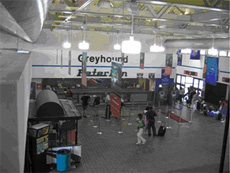
As part of each newsletter, we will be highlighting a different project from one of our grantees. If you would like to see one of your grant project accomplishments highlighted in an upcoming newsletter, please email us at TSAGrants@tsa.dhs.gov
The IBSGP is an important part of the Administration's larger, coordinated effort to strengthen homeland security preparedness, including the security of America's critical infrastructure. http://www.tsa.gov/join/grants/ibsgp.shtm.
The vast bulk of America's critical infrastructure is owned and/or operated by state, local and private sector partners. The funds provided by this program are primarily intended to support the work of operators of fixed route intercity and charter bus services.
During FY07, $11,640,000 in grant funds was devoted to IBSGP, $8,159,337 of which was allocated to Tier I bus companies. To be considered a part of Tier I, a bus company must demonstrate that it operates a fleet of more than 250 over-the-road buses. Out of the funds devoted to Tier I for 2007, passenger screening projects received 20 percent, or $1,631,867. Greyhound Lines of Dallas, Texas was one of the Tier I recipients of funds for passenger and baggage screening.
Greyhound proposed a program of expanded passenger and baggage screening for weapons and explosives that would "further implement passenger and baggage screening enhancements that focus on programs which utilize an established methodology for screening passengers, their carry-on baggage, and/or their checked baggage, for weapons and/or explosives." The K-9 program is funded with these grant dollars.
The program has been implemented over several years based on funding availability. Initially started after 9/11, with the additional urgency resulting from an incident about a month later when an individual knifed a driver at the wheel and caused a significant crash, Greyhound Lines began using magnetometers. Greyhound Lines contracts with security services to perform screening activities that are randomly chosen based on scheduling.
In 2006, Greyhound Lines and TSA partnered for a pilot project titled the "Bus Explosive Screening Technology" pilot test, on location in Washington, D.C. The test ran for six weeks and showed it is possible, but extremely expensive, to conduct passenger and baggage screening in the open-style environment of a bus station. One gate operated for eight hours a day for six weeks at a cost of nearly $400,000.
The test also showed that a feasible way of doing screenings is to utilize K-9 units. Greyhound Lines is in the process of putting out a Request for Proposals (RFP) to start using K-9s in four locations this year. Determined by criteria including high traffic counts and locations where K-9s can be effective, Washington, D.C., Houston, Texas, Los Angeles, California, and Atlanta, Georgia were selected. Greyhound Lines hopes to add more locations next year. The K-9 units will be used as a supplement to, not in place of, more traditional screening methods such as hand-held wands, as each screen for different things such as explosives vs. weapons.
Screeners know what to allow and what not to allow. The "Tickets and Travel" section of Greyhound Lines web site at http://www.greyhound.com offers Baggage Information that provides passengers information on what is and what is not allowable in baggage.
"This program is critical and Greyhound appreciates TSA's assistance with it. It is the only way we can provide enhanced security for our passengers. Greyhound Lines looks forward to expanding and continuing to see this program through. It is one of the cornerstones of our security program. The bus industry is an open system; we cannot secure every place that buses stop, but this offers a significant deterrent." according to Alessandro (Alex) Guariento, CDS, Vice President, Safety and Security at Greyhound Lines, Inc. in Dallas, Texas.
Download Plug-in
Some of the links on this page require a plug-in to view them, which are available below.



